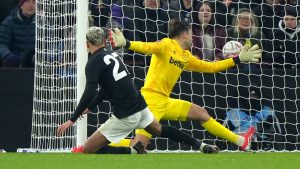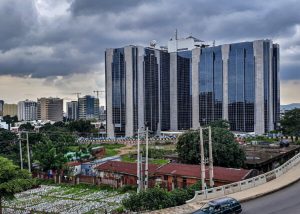AP Was There: Nadal edges Federer 9-7 in 5th at Wimbledon


-EDITOR’S NOTE — Tennis history is filled with wonderful rivalries, and so many are remembered because of matchups in Wimbledon finals. The Associated Press is republishing stories about a handful of such matches while the canceled grass-court Grand Slam tournament was supposed to be played. One memorable head-to-head rivalry is Roger Federer vs. Rafael Nadal, who have met in nine Grand Slam title matches, an Open era-record for men. Three were at the All England Club, in 2006-08. The following story, about their third final there, was sent July 6, 2008.
—-
By HOWARD FENDRICH
AP Tennis Writer
WIMBLEDON, England (AP) — Rafael Nadal, grass stains on his white shirt and a Spanish flag tucked under his arm, scampered through the Centre Court stands to celebrate his first Wimbledon title with hugs and handshakes.
Roger Federer sat in his changeover chair, protected from the night’s chill by his custom-made cream cardigan with the gold “RF” on the chest. Alone with his thoughts, alone with the knowledge that he had come so close to becoming the first man since the 1880s to win a sixth consecutive championship at the All England Club.
Two points from victory, the No. 1-ranked Federer couldn’t pull it out, instead succumbing to No. 2 Nadal 6-4, 6-4, 6-7 (5), 6-7 (8), 9-7 Sunday night in a 4-hour, 48-minute test of wills that was the longest men’s final in Wimbledon history — and quite possibly the greatest.
Even Nadal felt sympathy for Federer.
“I am very happy for me,” Nadal said, “but sorry for him, because he deserved this title, too.”
Through rain, wind and descending darkness, the two greatest players of their generation swapped spectacular shots, until, against a slate sky, Nadal earned the right to fling his racket aside and collapse on his back, champion of the All England Club at last.
“Is impossible to explain what I felt in that moment, no?” Nadal said after accepting the golden trophy that has belonged to Federer since 2003.
The first man since Bjorn Borg in 1980 to win Wimbledon and the French Open in the same year, Nadal stopped Federer’s streaks of 40 victories in a row at the All England Club, and a record 65 in a row on grass, thereby stamping his supremacy in their rivalry, no matter what the rankings say.
“Probably my hardest loss, by far,” Federer said. “I mean, it’s not much harder than this right now.”
No man since 1927 had come back to win a Wimbledon final after losing the first two sets, and none had overcome a match point to seize victory since 1948. If anyone could, it figured to be Federer, especially on this particular lawn.
He hadn’t lost a match on grass since 2002, and he hadn’t lost a set during this tournament before Sunday. He also hadn’t faced anyone nearly as talented and indefatigable as Nadal.
“Look, Rafa’s a deserving champion,” Federer said. “He just played fantastically.”
Indeed he did, earning Spain its first Wimbledon men’s title since Manolo Santana won in 1966.
Nadal managed to regroup after blowing a two-set lead, managed to recover after wasting two match points in the fourth-set tiebreaker, managed to hold steady when Federer needed only two points to end the match while ahead 5-4 in the fifth.
He earned his fifth Grand Slam title, but first away from the French Open, by showing fortitude on his serve, saving 12 of 13 break points. He did it by breaking serve four times — twice as many times as Federer lost serve in his previous six matches combined. And Nadal did it by being better from the baseline, winning 24 of 38 points that lasted 10 or more strokes, according to an unofficial AP tally.
“He was rock-solid, the way we know him,” said Federer, who hit 25 aces. “He’s definitely improved his game.”
Borg and Santana watched from the front row of the Royal Box at Centre Court, which next year will have a retractable roof. Perhaps Mother Nature wanted one last chance to leave her mark, delaying Sunday’s start by 35 minutes with rain. Showers again caused a delay of 1 hour, 21 minutes late in the third set, then another of 30 minutes at 2-2, deuce, in the fifth set.
When action resumed at 8:23 p.m., it already was tough to see, and the players traded service holds until 7-7. That’s where Nadal finally broke through, as Federer’s forehand really began to break down. A forehand into the net gave Nadal his fourth break point, and a forehand long conceded the game — the first break of serve by either man since the second set.
Nadal still had to serve out the match, though, and he still had to avoid the sort of nerves Federer noticed when his opponent led 5-2 in the fourth-set tiebreaker.
“I played terrible there,” said Nadal, who double-faulted to 5-3.
Down 6-5 in that tiebreaker, Federer erased a match point with a 127 mph service winner. Down 8-7 — again, one point from losing — Federer hit a backhand passing winner.
A forehand winner put Federer ahead 9-8, and when Nadal missed a backhand return, the match was even. Federer jumped and screamed, and the crowd of about 15,000 joined him.
“Rafa keeps you thinking, and that’s what the best players do to each other in the end,” Federer said. “That’s what we both do to each other.”
It was their sixth Grand Slam final, already more than between any other pair of men in the 40-year Open era, and there could be several to follow. Federer is only 26, after all, and Nadal is 22. Federer has led the rankings for a record 231 consecutive weeks, and Nadal has been second for a record 154.
Nadal defeated Federer at the French Open en route to each of his championships there, in the 2005 semifinals and the past three finals, including a 6-1, 6-3, 6-0 rout last month that was Federer’s most lopsided loss in 180 career Grand Slam matches.
But the Swiss star kept reminding everyone this week that he has had the upper hand on surfaces other than clay.
Not this time.
Nadal lost to Federer in the 2006 Wimbledon final in four sets, and the 2007 final in five. Although the latter was certainly suspenseful, it featured neither the drama nor the all-around excellence of Sunday’s encounter, which ended at 9:15 p.m., when Federer pushed a forehand into the net on Nadal’s fourth match point.
Federer made clear afterward he was not pleased that play continued despite the low visibility at the end.
“It’s rough on me now, obviously, you know, to lose the biggest tournament in the world over maybe a bit of light,” he said.
Said Nadal: “In the last game, I didn’t see nothing.”
Both players figured that if Federer had broken back to 8-8 in the fifth, play would have been suspended until Monday because of darkness.
“It would have been brutal,” Federer said.
It didn’t happen. Nadal came through.
Afterward, the new champion was asked if it was the greatest match he’d ever played. Plenty of others around the grounds, including John McEnroe — whose five-set loss to Borg in 1980 gets many votes — already were calling it the greatest match they’d ever seen.
“I don’t know if it’s the best,” Nadal said.
Then he thought about it for a moment.
“Probably,” he continued. “Probably the best, yes.”








